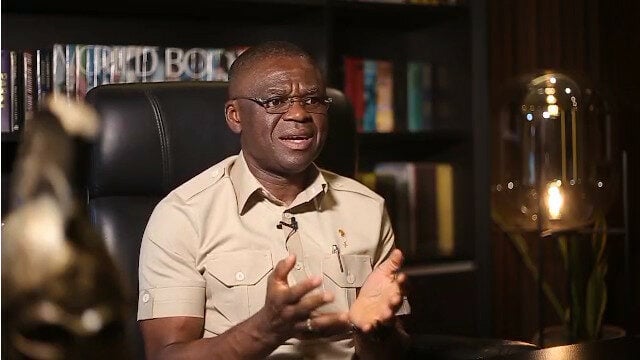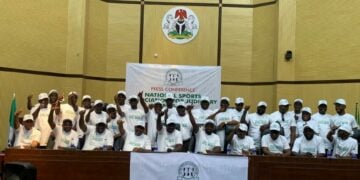The director-general and CEO of the National Institute for Sports (NIS), Comrade Philip Shaibu, has identified the lack of political will as the crucial missing link in Nigeria’s sports development. He emphasised the fundamental role of political will in driving national progress, particularly within the sports sector.
Shaibu made this declaration while delivering a keynote address at the Sports Writers Association of Nigeria (SWAN) 60th Diamond Anniversary Lecture, held at the VIP Lounge of the Moshood Abiola National Stadium in Abuja yesterday.
The former deputy governor of Edo State acknowledged SWAN’s significant contributions over the past six decades, praising its role as the voice of Nigerian sports, which has consistently advocated for improvement and accountability in the sector. He expressed gratitude for their commitment to documenting the achievements and challenges faced by Nigerian sports.
In his address, titled “The Missing Link: Political Will as a Driver of National Development,” Shaibu asserted that genuine political commitment from leaders is essential for fostering substantial progress in sports and beyond. He outlined three dimensions of political will: the vision and commitment to pursue long-term goals, the courage to implement challenging reforms, and the consistency required to maintain initiatives across electoral cycles.
The NIS boss lamented the declining state of Nigeria’s sporting infrastructure, stating, “Some of our facilities have trees growing through tennis courts.”
He attributed this neglect not to a lack of talent but rather to a failure to prioritise sports development politically. In contrast, he cited successful transformations in Edo State during his tenure as Deputy Governor, demonstrating what can be achieved with sufficient political support.
Shaibu also highlighted the economic potential of the sports industry, valued at approximately $500 billion globally, emphasising that investing in sports infrastructure could yield significant economic benefits for Nigeria, including job creation and enhanced tourism. He urged leaders to recognise sports as a vital economic driver rather than merely a recreational pursuit.
Drawing comparisons with countries such as Singapore, South Korea, and Rwanda, Shaibu underscored that disparities in development often stem from the political will to implement and sustain strategic policies. He noted that Nigeria’s challenges frequently arise not from a lack of sound policies but from the failure to follow through on existing plans.
The NIS chief called on sports journalists to play an active role in nurturing political will and accountability in the sporting sector. He highlighted their responsibilities in advocating for meaningful change, scrutinising officials, and amplifying the voices of athletes and other sports stakeholders.
In concluding his address, Shaibu proposed a framework for strengthening political will that includes institutional strengthening, data-driven decision-making, stakeholder engagement, transparency, and capacity building. He reaffirmed NIS’s commitment to transforming into a world-class centre for sports development but cautioned that success relies on collaborative efforts from all stakeholders in the sector.
As SWAN celebrated its diamond jubilee under the theme “The Power of Sports Media: Honouring its Legacy, Shaping the Future,” Shaibu’s challenge resonated deeply: “Your pens and microphones are not merely tools for reporting; they are instruments for national development.”
With a hopeful outlook, he called for collective action, declaring, “The missing link of political will is within our grasp. Let us seize it together for the Nigeria of our dreams.”
The event highlighted the vital intersection of politics, media, and sports, setting a hopeful tone for the future of Nigerian sports and its potential for national development.





